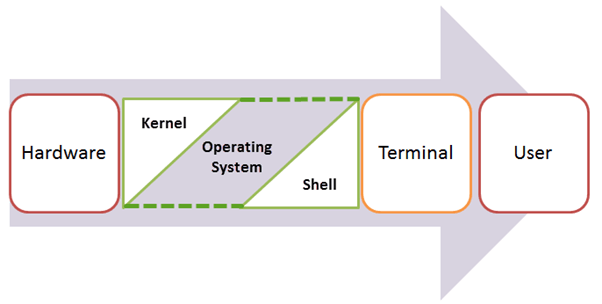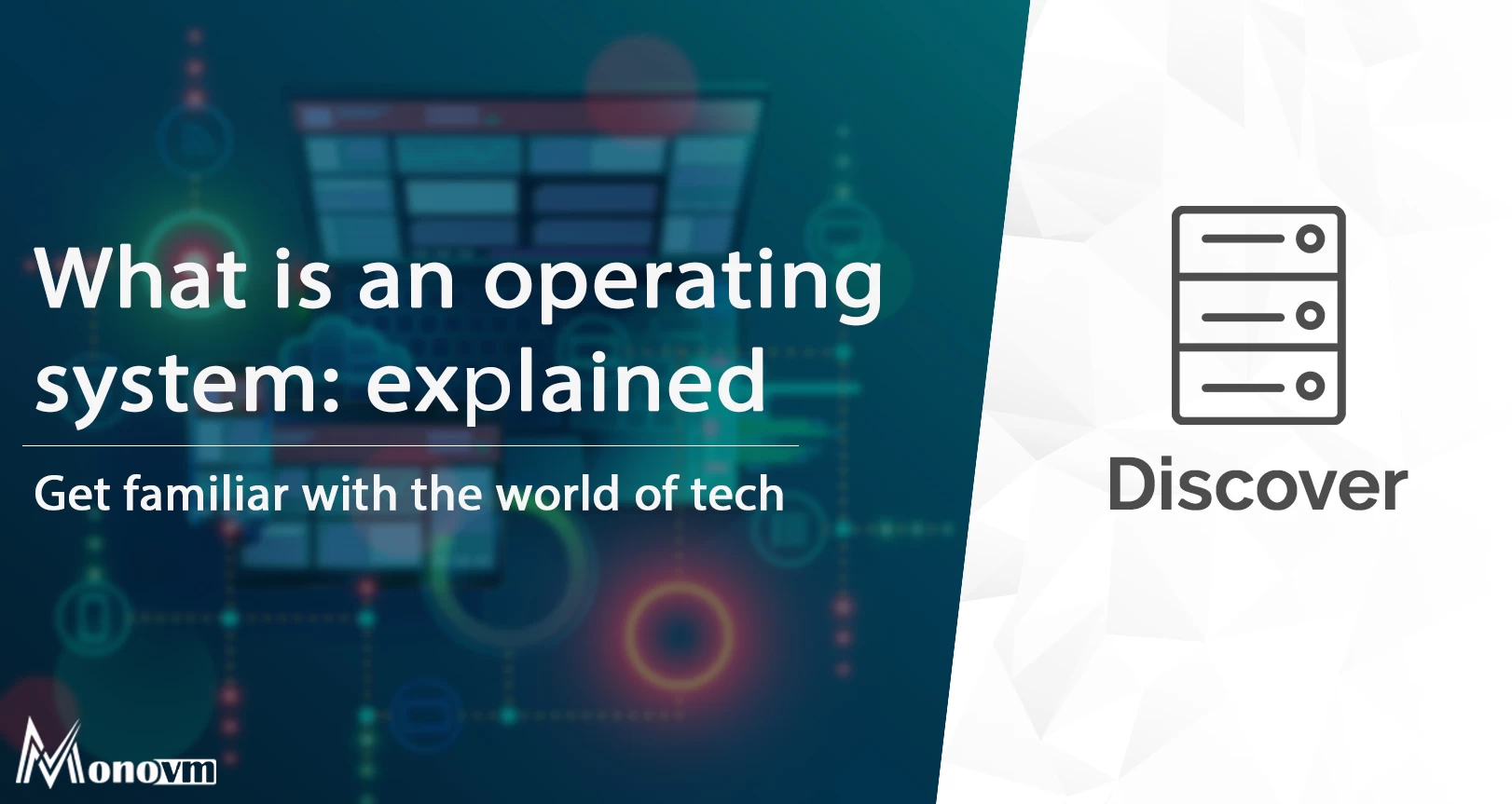List of content you will read in this article:
An operating system is the core of every computer and acts as an interface between the user and the computer's hardware. The operating system will provide you with an environment where the user can execute various tasks and programs quickly without interfering with the working of each other. An operating system is a program that helps manage the computer's hardware.
Today, there are several operating systems available in the market that you can choose and opt for working. In this article, we will be discussing the operating system in detail, along with its features, advantages, and disadvantages.
What is an operating system?
An operating system is considered a program or software that helps manage the seamless execution of the applications and act as an interface for all the users and the underlying hardware of the computer. Also, you can say that an OS is a single program capable of running various programs all the time without any issue and allocate system resources such as memory, services, processors, devices, and others for the easy execution of these applications.
Late 1950 began the introduction of the operating system when the first OS was developed to manage tape storage. The General Motors research lab implemented the first OS in 1950 for handling the IBM 701. During 1960, disks were being used by the operating systems. Then later, in 1960, the first version of the Unix OS was launched and came into the market. Microsoft created their first OS- DOS in 1981 on top of the 86-DOS software.
However, there is a long list of OS available in the market. Below is the list-
|
OS Name |
Share |
|
Windows |
40.34 |
|
Android |
37.95 |
|
iOS |
15.44 |
|
Mac OS |
4.34 |
|
Linux |
0.95 |
|
Chrome OS |
0.14 |
|
Windows Phone OS |
0.06 |
Types of Operating System
Below is the list of various types of operating systems available.
- Batch Operating System
Some processes can be time-consuming and require most of the computer resources. Therefore, the operations with the exact needs are batched together to be run together. The user who creates the batch processing system will not be able to interact with the computer directly. For this type of OS, the user have to prepare the group of the processes on the offline device and then provide it to the computer operator to execute.
- Multi-Tasking/Time-sharing Operating systems
This type of operating system allows users to work on a single computer system even though they are located at different terminals. All they can work at the same time. In this case, the CPU is shared among multiple users and is known as time-sharing.
- Real-time OS
In such a type of operating system, the time for processing and responding to various inputs are minimal. Some examples of the real-time OS are- military software systems, space software systems, and others.
- Distributed Operating System
This type of operating system depends on processors distributed across the network at different locations and in multiple machines. This will help provide fast computations to their users working on those systems.
- Network Operating System
These operating systems run on the server, making them capable of handling network data, users, groups, and other functionalities.
- Mobile OS
These are the OS designed for powering smartphones, tablets, and other mobile devices.
Characteristics of operating system
Below are the essential characteristics of any operating system.
- Convenience: with the help of the OS, a computer becomes more convenient to use.
- Efficiency: An OS manages the system's resources efficiently so that the resources will get allocated equally among all running applications.
- Ability to Evolve: An OS should be able to help in the effective development, testing, and introduction of new functions simultaneously without impacting the performance of other services.
- Throughput: An OS should manage several tasks per unit time.
Functions of the operating system
Below are the core functions of an operating system.
- Resource Management:
Whenever the system is being used by several users simultaneously, the operating system will act as a resource manager. It will become the primary responsibility of the operating system to provide the hardware to all the users to decrease the unnecessary load on the system.
- Process Management:
Process management means the capability of the operating system to manage all the running processes within the system. It will include various tasks like scheduling, ending a process, and others. Whenever more than one process is running, it is the core responsibility of the OS to schedule the CPU to complete all the tasks simultaneously.
- Storage Management:
An operating system uses the file system mechanism for managing the system's storage. Some commonly used filesystems are- NIFS, CFS, CIFS, NFS, and others. The storage manager is capable of handling all the data stored within the various tracks of the hard disk, including the hard disk.
- Memory Management:
Memory management refers to the management of the primary memory. One core responsibility of the operating system is to manage and keep track of the memory being used and how much remains. An operating system will decide which process will be allocated how much memory. Apart from allocating the memory, OS will also take care of deallocating the memory.
- Security/Privacy Management:
From the operating system perspective, privacy refers to the passwords that are being set for the system so that only people having authorized access can access the programs and data stored within the system.
Advantage of using Operating System
Below are all the advantages of working on an operating system.
- OS uses an abstraction layer for hiding the details of the underlying hardware.
- OS comes with an interactive GUI for better working.
- It will provide an environment for production, testing, and executing applications.
- It acts as an interface that will allow the users to interact with the underlying hardware.
Disadvantages of using Operating System
Below are some disadvantages that you may face working on an operating system.
- If there is any system failure, it might be possible that you lose all your data stored within the system.
- There is various software for the operating system that is paid and may burden small organizations.
- If we consider security, the operating system is not entirely secure and is prone to attack if proper security measures are not placed appropriately.
What is Kernel in Operating System?
The kernel is a core component of any operating system. As an operating system, a kernel is also an interface that helps manage the communication between the software and the hardware. The kernel helps in the low-level scheduling of all the processes running on the top of the system. It synchronizes every process and manages the resources appropriately to work correctly.

Conclusion
With an operating system, you will not be able to leverage the benefits of a computer. You will not get to use the available applications with the operating system. It acts as an interface between the user and the hardware for carrying out various tasks simultaneously. Even the OS is responsible for handling the execution of multiple tasks simultaneously, so they will not interact with each other's work. An OS will keep track of all the system resources allocated for the seamless working of the programs and applications.
Various OS is available in the market, such as Windows, Linux, Unix and Unix-like, MacOS, etc. An OS has made out lives simpler since the 1950s that led to the introduction of the first OS. After that, a tremendous evolution of OS has been seen with various functionalities.
With this article, you will get to know the advantages, disadvantages, and functions of an OS. However, this is not the end of OS; the field is so vast. We have only shared the basic understanding of what an OS is and how it works.

I'm fascinated by the IT world and how the 1's and 0's work. While I venture into the world of Technology, I try to share what I know in the simplest way with you. Not a fan of coffee, a travel addict, and a self-accredited 'master chef'.